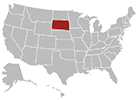
They are the ones collecting blood for testing or for donations.
Becoming a phlebotomist in South Dakota is a relatively short and easy process, and you can learn all about it from this presentation!
Page Navigation
Phlebotomist Employment and Job Duties in South Dakota
Knowing what this job entails answers some questions, but where can you get hired?
These are the places offering a job to these technicians:
- Hospitals
- Clinics
- Blood banks
- Laboratories
- Nursing homes
- Community health centers
Each of these places has its own job description, but the duties aren’t so different.
It’s possible to have to work evenings and weekends for some of the above establishments.
You’ll usually have to:
- Select the correct vials
- Place the correct labels on blood samples
- Organize and send off samples
- Communicate with and comfort the patients
- Ensure the safety of the patients
- Ensure the cleanliness of the workplace
Requirements to Become a Phlebotomist in South Dakota
It’s not mandatory for aspiring phlebotomists in South Dakota to have specialized training and certification.
Yet, those who choose to learn all about this occupation and pass the certification examination, have higher chances of getting hired.
The main requirements for this position are:
- A high school diploma or GED
- A clean criminal record
- Strong communication skills
- Good listening skills
- Being detail-oriented
- Being able to wok in a team
- Having CPR certification
Some of the facilities mentioned earlier could ask for a different set of skills and documentation.
Phlebotomist Training in South Dakota
The training programs for future phlebotomists need to be approved.
As you’ll see, there aren’t many schools in South Dakota offering such training.
Luckily, you can seek a program either online or in one of the neighboring states.
You’ll have to ensure you have access to a clinic or hospital for laboratory classes and an internship for practice purposes.
Training is not for everybody, only those who can meet the following criteria can enroll:
- At least 18 years old
- Have a high school diploma or GED
- Recent immunizations
- Pass a background check
- Basic computer skills
- Strong English skills – reading, writing, speaking
- Having insurance
- Having a driver’s license
It’s possible for some institutions to request a CPR certification for enrollment or to attend a class issuing this diploma.
These are the South Dakota schools you can consider enrolling at.
5 Phlebotomy Schools in South Dakota
| School Name | Address |
|---|---|
| Colorado Technical University | 3901 W. 59th Street Sioux Falls, SD 57108 |
| Lake Area Technical Institute | 230 11th Street NE PO Box 730 Watertown, SD 57201 |
| Southeast Technical Institute | 2320 N Career Ave, Sioux Falls, SD 57107 |
| University of South Dakota | 414 East Clark Street Vermillion, SD 57069 |
| Western Dakota Tech | 800 Mickelson Drive, Rapid City, SD 57703 |
Generally the duration of the program and its cost is what differentiates them.
A higher tuition usually means that the following may also be covered for:
- The fees for the exam
- The uniform for the graduation
- Lab tools
- Textbooks
The topics in phlebotomy training program are similar to the following:
- Medical terms
- Anatomy
- Physiology
- Safety procedures
- The 40 most common lab tests
- Pediatrics,
- Needle or syringe draws
- Butterfly needles
Those attending the Colorado Technical University at Sioux Falls not only will obtain a certificate in phlebotomy but also an Associate of Science degree.
This university is not the only one issuing an associate’s degree suited for the medical field.
Regardless of the program and college you choose, be certain you’ll have all the tools needed for an entry-level position like that of a phlebotomist.
Phlebotomist Certification in South Dakota
In the states where a phlebotomy certification is not needed, employers prefer candidates to be nationally certified.
Such a certificate is issued by a handful of agencies, including these ones:
- American Society for Clinical Pathology
- American Society of Phlebotomy Technicians
- National Phlebotomy Association
You’ll first have to attend training as described earlier.
To get the national certificate, you’ll have to pass the exam first.
Some candidates may not need to enroll in a training program if they already have enough work experience in this field.
The exam is not the same across all the agencies, but all of them need you to prove your skills in a practical test.
You’ll also have continue your education every year, to be able to renew your certification.
Phlebotomist Salary Information in South Dakota
You’ll notice that your salary will be influenced by a series of factors, including the city you live and work in.
Annual Salary Range:Average Salary of Phlebotomists in South Dakota
| City Name | Salary |
|---|---|
| Sioux Falls | $31,682 |
| Rapid City | $30,630 |
| Aberdeen | $28,764 |
| Brookings | $31,153 |
| Watertown | $31,153 |
| Mitchell | $31,153 |
| Yankton | $30,436 |
| Pierre | $29,293 |
| Huron | $29,958 |
| Spearfish | $30,101 |
Regional Salary
| Region | Employed | Avg. Annual Salary | Avg. Hourly Pay | Top 10% Annual Salary | Bottom 10% Annual Salary |
|---|---|---|---|---|---|
| Rapid City, SD | 90 | $37,200 | $17.88 | $43,680 | $31,450 |
| Sioux Falls, SD-MN | 190 | $38,290 | $18.41 | $44,170 | $30,210 |
* Employment conditions in your area may vary.
Additional Information for Phlebotomists in South Dakota
It’s advisable to try and obtain an associate’s degree for the medical field or a higher one, if you want more career options in the future.
 Phlebotomy Schools by City
Phlebotomy Schools by City
This page is also available in Spanish.







